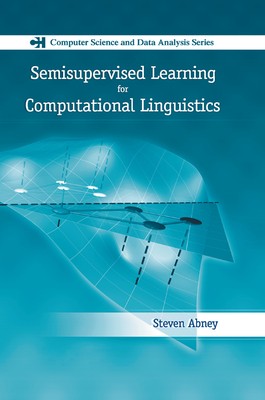
- We will send in 10–14 business days.
- Author: Steven Abney
- Publisher: CRC Press
- ISBN-10: 0367388634
- ISBN-13: 9780367388638
- Format: 15.5 x 23.1 x 1.8 cm, minkšti viršeliai
- Language: English
- SAVE -10% with code: EXTRA
Semisupervised Learning for Computational Linguistics (e-book) (used book) | bookbook.eu
Reviews
Description
The rapid advancement in the theoretical understanding of statistical and machine learning methods for semisupervised learning has made it difficult for nonspecialists to keep up to date in the field. Providing a broad, accessible treatment of the theory as well as linguistic applications, Semisupervised Learning for Computational Linguistics offers self-contained coverage of semisupervised methods that includes background material on supervised and unsupervised learning.
The book presents a brief history of semisupervised learning and its place in the spectrum of learning methods before moving on to discuss well-known natural language processing methods, such as self-training and co-training. It then centers on machine learning techniques, including the boundary-oriented methods of perceptrons, boosting, support vector machines (SVMs), and the null-category noise model. In addition, the book covers clustering, the expectation-maximization (EM) algorithm, related generative methods, and agreement methods. It concludes with the graph-based method of label propagation as well as a detailed discussion of spectral methods. Taking an intuitive approach to the material, this lucid book facilitates the application of semisupervised learning methods to natural language processing and provides the framework and motivation for a more systematic study of machine learning.EXTRA 10 % discount with code: EXTRA
The promotion ends in 23d.23:12:43
The discount code is valid when purchasing from 10 €. Discounts do not stack.
- Author: Steven Abney
- Publisher: CRC Press
- ISBN-10: 0367388634
- ISBN-13: 9780367388638
- Format: 15.5 x 23.1 x 1.8 cm, minkšti viršeliai
- Language: English English
The rapid advancement in the theoretical understanding of statistical and machine learning methods for semisupervised learning has made it difficult for nonspecialists to keep up to date in the field. Providing a broad, accessible treatment of the theory as well as linguistic applications, Semisupervised Learning for Computational Linguistics offers self-contained coverage of semisupervised methods that includes background material on supervised and unsupervised learning.
The book presents a brief history of semisupervised learning and its place in the spectrum of learning methods before moving on to discuss well-known natural language processing methods, such as self-training and co-training. It then centers on machine learning techniques, including the boundary-oriented methods of perceptrons, boosting, support vector machines (SVMs), and the null-category noise model. In addition, the book covers clustering, the expectation-maximization (EM) algorithm, related generative methods, and agreement methods. It concludes with the graph-based method of label propagation as well as a detailed discussion of spectral methods. Taking an intuitive approach to the material, this lucid book facilitates the application of semisupervised learning methods to natural language processing and provides the framework and motivation for a more systematic study of machine learning.

Reviews